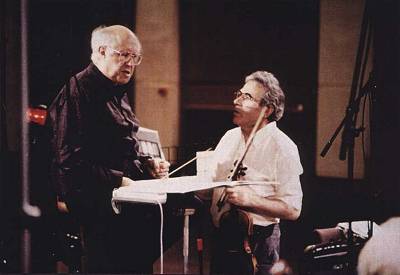|
VIOLIN MASTER

GORDON RUMSON reports on a rare
Carnegie Hall appearance of Mark Lubotsky
On Sunday 9 February 2003, the eminent violinist Mark Lubotsky will perform
an infrequent North American concert at Carnegie Hall in New York. One of
the most polished and sensitive violinists of his time, Lubotsky studied
with the great David Oistrakh at the Moscow Conservatory and was a prize
winner at the Salzburg Mozart Competition and Moscow Tchaikovsky Competitions.

Mark Lubotsky (left) with his teacher, David Oistrakh
|
Born in 1931 Lubotsky is one of the members of that golden time of Russian
musicianship that included such figures as Richter, Gilels, Rostropovich,
Shostakovich and Schnittke. Reared in the strife of World War Two, under
the terror of Stalin and through the Communist rule, these musicians retained
a sense of music and tradition from the nineteenth century. Music remained
a pathway to truth when surrounded by chaos and lies.

Rostropovich (left) with Lubotsky
|
I have often wondered when someone will investigate the psychological
effect of music in the Soviet era. Sound could and did remain free in a
deep philosophic sense. While painting, poetry and literature could be censored,
how could a beautiful tone, a beautiful melody, a beautiful harmony be controlled?
Certainly the government attempted to do so but in the final analysis though
the censors could alter to text of Fidelio or the Ninth Symphony, they could
do nothing to the theme of the B flat Sonata of Schubert or a Nocturne by
Chopin. Hence even in such a poisoned atmosphere the crucial power of music
was retained. When musicians in the West were surrounded by muzak, the Soviet
musicians had music in their hands as an unsullied pathway to truth beyond
propaganda (and we in the West have not moved much past media propaganda).
For this reason Soviet era musicians retained a sense of the potency of
music far beyond music as mere entertainment. I believe that this is one
of the fundamental reasons for the widespread success of Russian-trained
musicians.
Continue >>
Copyright © 4 February 2003
Gordon Rumson, Calgary, Alberta, Canada

|

